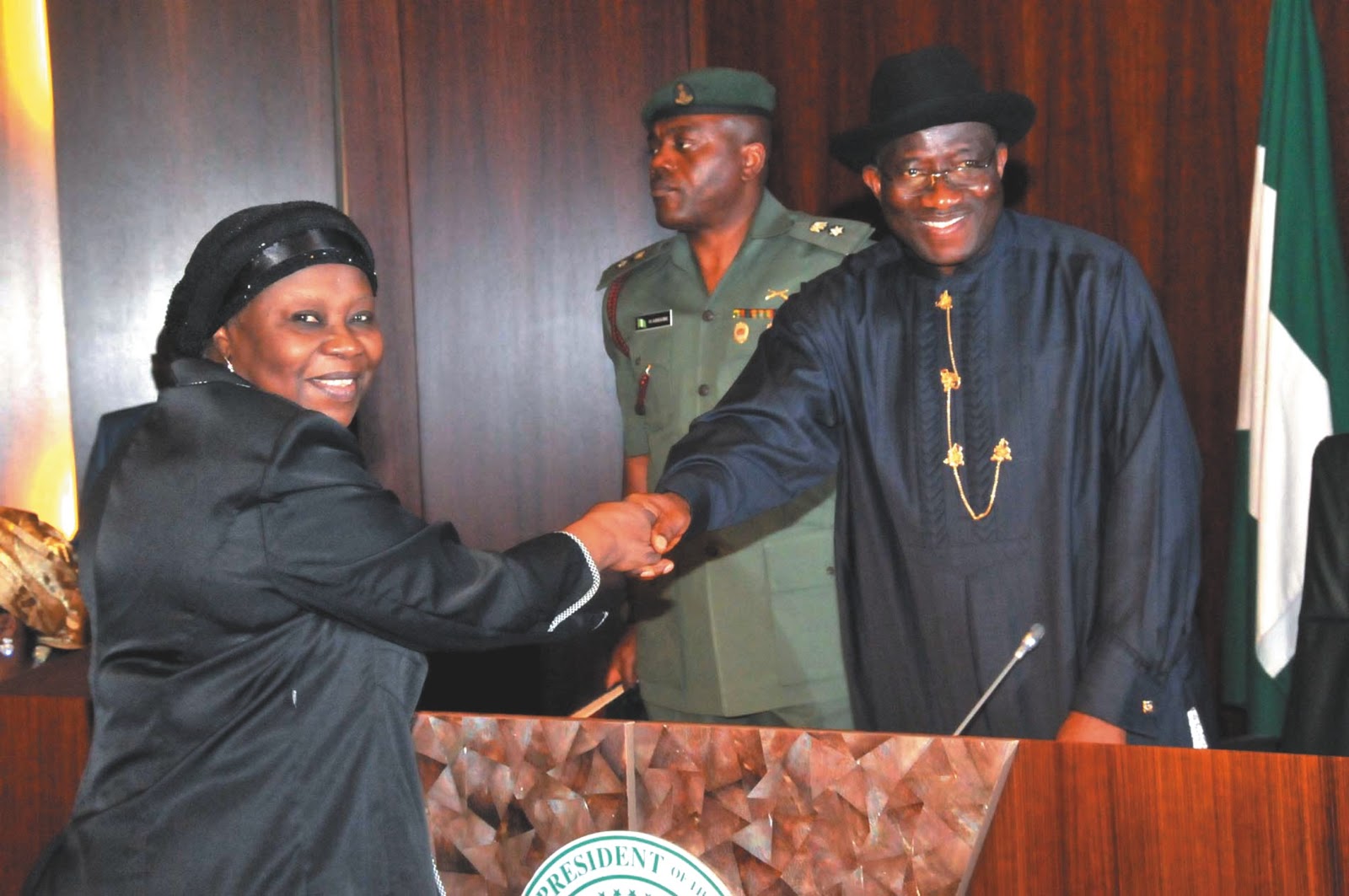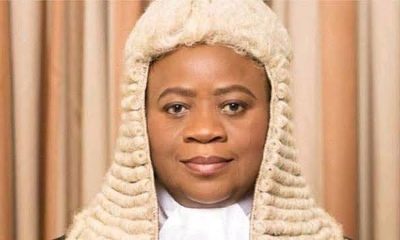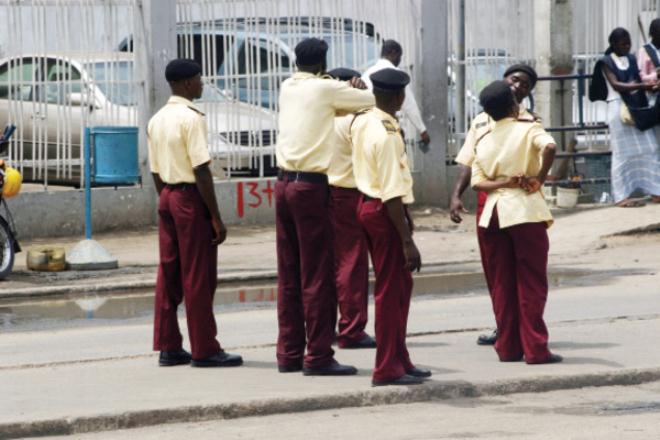Comments and Issues
Special Investigation: How Mukhtar railroaded Jonathan into retiring Olotu
Published
7 years agoon
By
Olu Emmanuel
After two panels then CJN and Chairman, National Judicial Council, Aloma Mukhtar commissioned in 2013 to probe the alleged misconduct of Justice Gladys Olotu, a judge of the Federal High Court, Abuja, the National Judicial Council met twice to get what Mukhtar wanted: Olotu’s head.And she got it on a platter of gold.
With a three-pager she sent to then President Goodluck Jonathan through his Attorney General, Mohammed Adoke, Olotu was frozen out of the judiciary–untimely.
A court exhibit reveals that Mukhtar wrote in a letter dated 28th February, 2014 to President Jonathan that-
“The Committee found the conduct of Hon Justice G K Olotu in aforestated matters as serious misconduct. His Lordship’s conduct contravened the provisions of the 1999 Constitution of the Federal Republic of Nigeria as amended and Code of Conduct for Judicial Officers as well as her oath of office.
Consequently, Council, in the exercise of its powers under paragraph 21(b) of Part 1 of the Third Schedule of the 1999 Constitution of the Federal Republic of Nigeria, as amended, decided to recommend to Your Excellency the compulsory retirement of Hon. Justice G.K Olotu from office for gross misconduct vide Section 292 subsection (1((b) of the same constitution, please,”
And so it was—that Olotu was forced out in 2014.
The end justified the means. Because most of what the first female CJN and her NJC chalked up as gross misconducts were not. Failure to deliver a ruling on scheduled date, for instance, is no misconduct under any law in Nigeria.
Some of the grounds on which the council did what some legal and judicial minds keep describing as a witch hunts were the string of investigations of allegations—contained in seven petitions, according to Mukhtar— her panels looked into.
But a number of them were made up by the panels and Mukhtar and not by the petitioners – Barr Ikenna Azubuike or Hon Ben Nwankwo or Elf Petroleum Nigeria Limited and its contractors.
Before the first panel, Nwankwo admitted his error in writing his petition and withdrew it because he had written it out of ignorance. Azubuike prayed in his main petition that Olotu be asked to conclude hearing of his case because she could not refuse to perform a public duty for personal reasons. Olotu had earlier on discontinued hearing of the matter for personal reasons.
The first panel headed by Justice O. O. Bamigbola, Chief Judge, Kwara State found in respect of Nwankwo’s petition as follows-
“We find that the petition by Hon. Ben Nwankwo complaining of his not being heard, was based on an erroneous belief that it was the responsibility of the judge to join him as a party. Hon Nwankwo has a duty if he is interested in the matter before the Court to seek to be joined… In conclusion, we consider that Hon Ben Nwankwo rightly withdrew the petition before us”
Another erroneous finding of Bamigbola’s panel concerns the date Azubuike filed his case in court. The panel in its two reports stated the date Azubuike filed his case as 2011. Other reliable sources reveal that the record of proceedings of the Bamigbola Panel show that the evidence from Nwankwo and Azubuike gave the date that Azubuike filed his action as August 2012( after waiting for 14months after his action arose) and not 2011 as found by Bamigbola Panel in their reports.
Azubuike alleged in his petition that his case was adjourned to “23rd April 2013 to take all pending applications together with the substantive suit.” There is however absolutely nothing in the record of the Panel to support their finding that the case came up for judgement on 23rd April, 2013.
It can seen that there there is no allegation from the petitioners in their petitions or in the record of the. Panel to support the finding of the Panel that Olotu “failed to deliver judgement twice.” So, it was a creation of the Panel.
Mukhtar , while chastising Bamigbola and his team for not delivering Olotu’s head on a platter, made her own allegation to the panel–” that in the case in hand, judgement was not given in 6months. She pointed out that apparently the Committee was not thorough in its investigation as she had read the petitions against the Judge personally.” There is no allegation to this effect from the petitioners or evidence from them before the panel
Bamigbola and his panel rewrote their report as directed by her majesty Hurricane Mukhtar and found Olotu guilty of failing to deliver judgement twice after the case reached judgement stage twice. They even backdated their report.The panel consequently made findings in their second report which did not arise from the petitions and evidence before them.
The scenario where the CJN and Chairman of Council and her panel became accusers/petitioners against a judge being investigated presented itself. In spite of turning themselves to accusers/petitioners against Olotu, Mukhtar continued to preside in the Councils’s meeting to discuss Olotu’s investigation and set up the second panel to investigate Olotu. Bamigbola’s Panel also continued their investigation against Olotu.
One wonders if this is not a breach of the cardinal principle of fair hearing- Mukhtar and her panel became judges in their own causes, thereby tainting the entire proceedings of the Council concerning Olotu with bias and prejudice and mortal breach of the fair hearing rule and abuse of office. The continued investigation of Olotu also raised serious questions of the independence and impartiality of Mukhtar, the Council and its panels, including the second panel later set up by Hurricane Mukhtar.
Another aspect of the investigation is that Bamigbola and his panel did not at any time confront Olotu with the allegation they lodged against her. There was therefore no proper investigation in the true meaning of the word before the Panel made its report to the Council headed by Mukhtar and the Council accepted the report.
On the issue of delay of judgement in the Port Harcourt/Uyo case, the second panel headed by Justice Abimbola Olopade, Chief Judge of Ogun State found that Olotu misconducted herself by not delivering the judgement after 90days contrary to the Constitutional provision. This was inspite of the evidence from Olotu that the delay in delivering the judgement was caused by the heavy workload she had to deal with in her new station, Port Harcourt after her transfer from Uyo, and other ad-hoc official assignments. The second panel also ignored the evidence before them showing that during the relevant period covering about 7 quarters, Olotu had about 4000 cases assigned to her during the period, 5000 cases/motions pending before her at the end of the material period, heard and concluded about 730 cases/ motions – about 200 of which were contested. The panel also did not consider relevant the facts before them that Olotu concluded the case in question within three years in spite of her transfer from Uyo to Port Harcourt and other exigencies of duty.
We have seen in recent times the Council imposing less severe punishment on judges found guilty of this same alleged misconduct – Justices Ajumogobia, Enebeli, Esowe and Etuk were given serious warning. Some of them were in addition put on the NJC watchlist for different lengths of time. Esowe’s time on the watch list was one year, Enebeli got 3 years, and Ajumogobia got 4 years. Etuk did not get any time on the watch list.
The lack of uniformity in the way the Council imposes punishment on judges for the alleged misconduct of delay in delivering judgement seems to lend credence to what some legal and judicial minds have said that there is no law in Nigeria making delay in delivery of judgements a misconduct and also no law prescribing the punishment to be imposed on the judges for delay in delivering judgements.
ALSO SEE: CJN Onnoghen under pressure to re-instate Olotu
It is also observed that the panel did not recommend retirement for Olotu. It only recommended “sanctions” The issue of her retirement as can been seen from the minutes of meeting of the Council came out of the blues.
Olotu was also retired for an administrative lapse- that the case file in the Uyo case brought to Port Harcourt on the orders of the Chief Judge for Olotu to conclude in Port harcourt was not returned to Uyo after she concluded the case. The petitioners specifically made this allegation against the Port Harcourt Registry, but Olopade’s panel held Olotu responsible for the administrative lapse and ignored her defence that she was not responsible for the movement of files in the court. This is one of the “misconducts”which the Council chalked against Olotu for her retirement.
The Olopade Panel found that Olotu’ s failure to deliver a ruling on the scheduled dateč was misconduct. The petitioners, Elf Petroleum Ni geria Limited and its contractors did not make any allegation to this effect. The Olopade Panel came up with it in their recall proceeding. Consequently, they became judges in their on cause just like Bamigbola Panel and Mukhtar.
But, according to ex-CJN Muktar, the reports of the two committees were considered and accepted by the NJC at its meetings in which she was chairman. She appealed to the constitution, code of conduct for judicial officers and the judges oath of office to sell Olotu’s guillotine to Jonathan.
Interestingly, Muktar did not state the specific provisions by the constitution or the code of conduct and oath of office which Olotu contravened to warrant her retirement. So, the laws Olotu actually contravened the necessitated her premature retirement are not known to anyone till date – not to Muktar, not to President Jonathan and his Attorney General, Mohammed Adoke, not to Council, and certainly not to Olotu!
Olotu has since 2014 sought justice in court—against Mukhtar, Jonathan, Adoke, NJC, and many others in the orchestra that eased her out of her job.
The ex-CJN was spitting fire then, especially because Olotu took her to court.
Many have believed the court is the last hope of the common man.
It’s now the solace of a frustrated federal judicial officer that has spent almost half of her life in service of justice.
You may like


Appeal Court President warns Election Petition Tribunal secretaries, support staff against misconduct


Airtel, 9mobile get N127m fine over misconduct


Buhari hasn’t sacked me, Ofili-Ajumogobia tells court


LASTMA arrests five officials for extortion


Police Service Commission to probe Edo CP, others over misconduct


SERAP urges CJN to lift the ‘cloud’ hanging over Justice Salami Committee
Trending

 Comments and Issues2 days ago
Comments and Issues2 days agoAs Ariwoola takes the judiciary to the top of the grease pole

 Business6 days ago
Business6 days agoNMDPRA Chief faces backlash over comment on Dangote Refinery

 Business1 week ago
Business1 week agoGlobal cyber outage disrupts flights, Banks, telecoms, Media

 Business1 week ago
Business1 week agoKPMG criticizes FG’s 50% windfall tax, foresees legal disputes

 Business5 days ago
Business5 days agoZenith Bank retains position as Nigeria’s Tier-1 capital leader

 Education7 days ago
Education7 days agoJAMB reacts to allege age limit by ministry of education

 News6 days ago
News6 days agoPhilip Shaibu officially joins APC, dumps PDP

 Comments and Issues5 days ago
Comments and Issues5 days agoOnanuga and the Surprise from Joe Igbokwe




